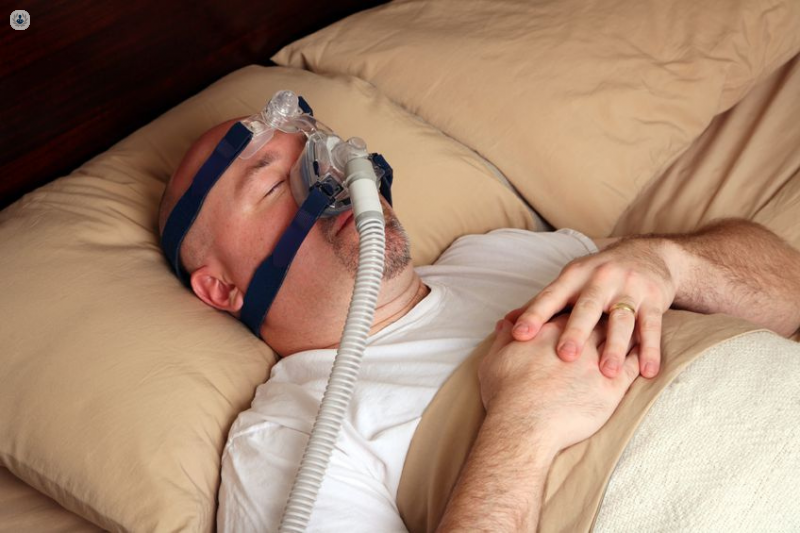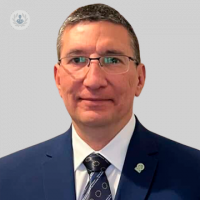What are the main symptoms of sleep apnoea?
Written in association with:In one of Top Doctors’ latest medical articles here below, esteemed GP, Professor Carlos Rivas Echeverría, discusses sleep apnoea, including the main associated symptoms and causes.

What is sleep apnoea?
Sleep apnoea is a sleep disorder in which breathing stops and starts repeatedly during sleep. It can cause serious health problems if left untreated.
What are the main associated symptoms of sleep apnoea?
There are many symptoms of sleep apnoea. These include:
- Loud snoring
- Gasping or choking during sleep
- Waking up with a dry mouth or sore throat
- Headaches in the morning
- Daytime sleepiness or fatigue
- Mood changes or irritability
- Difficulty concentrating or memory problems
- Obesity
- Hypertension
- Cardiovascular diseases (myocardial infarction, atrial fibrillation and other arrythmias, heart failure).
- Stroke
- Gastroesophageal reflux disease
What are the main causes of sleep apnoea?
Sleep apnoea can be caused by various factors, such as:
- Obstructive sleep apnoea (OSA): the most common type, where the throat muscles relax and block the airway during sleep.
- Central sleep apnoea (CSA): a rare type, where the brain fails to send signals to the muscles that control breathing during sleep.
- Complex sleep apnoea syndrome: a combination of obstructive sleep apnoea and central sleep apnoea.
Some of the risk factors for sleep apnoea are:
- Being overweight or obese
- Having a narrow airway, large tonsils or adenoids, or a deviated septum
- Smoking, drinking alcohol, or using sedatives
- Having a family history of sleep apnoea
- Being older, male, or postmenopausal
How is sleep apnoea diagnosed?
To diagnose sleep apnoea, a doctor may ask about your symptoms, medical history, and lifestyle. There is a problem here, though, as most patients do not recognise having the symptoms and most doctors do no assess those symptoms in patients with clinical features for obstructive sleep apnoea. They may also refer you to a specialist sleep clinic for further tests, such as:
- Polysomnography: a sleep study that measures your brain activity, heart rate, blood oxygen level, breathing patterns, and body movements during sleep. Expensive and not available in most places, and also normally does not add more information. It is being used mainly for research.
- Home sleep apnoea test: a simplified version of polysomnography that you can do at home with a portable device.
What are the most effective treatment options for sleep apnoea?
The treatment for sleep apnoea depends on the type and severity of the condition. Some of the most effective treatment options include:
- Lifestyle changes: such as losing weight, quitting smoking, avoiding alcohol and sedatives, sleeping on your side. These only work in mild cases.
- Continuous positive airway pressure (CPAP): a device that delivers pressurised air through a mask to keep your airway open during sleep.
- Oral appliances: devices that fit in your mouth to adjust your jaw position and prevent your tongue from blocking your airway. Secondary treatment option in moderate to severe cases. A good assessment is needed and not very many specialists can do this.
- Surgery: procedures that remove excess tissue from your throat, nose, or mouth, or more importantly, maxillomandibular advancement surgery. This works in patients with craniofacial deformities.
How is sleep apnoea managed?
Sleep apnoea can affect your quality of life and increase your risk of developing other health problems, such as high blood pressure, heart disease, stroke, diabetes, and depression. Therefore, it is important to manage your condition by following your doctor’s advice and using your prescribed treatment regularly. You should also:
- Monitor your symptoms and report any changes to your doctor
- Avoid driving or operating machinery if you feel sleepy or drowsy
- Seek help for any emotional or mental issues that may arise from your condition
If you’d like to schedule in an appointment with Professor Carlos Rivas Echeverría today, simply head on over to his Top Doctors profile.


